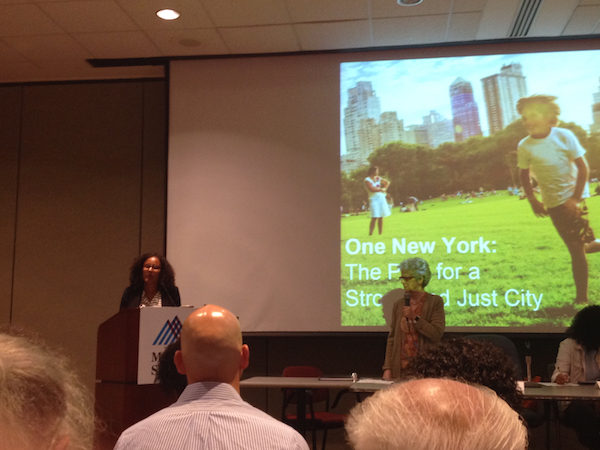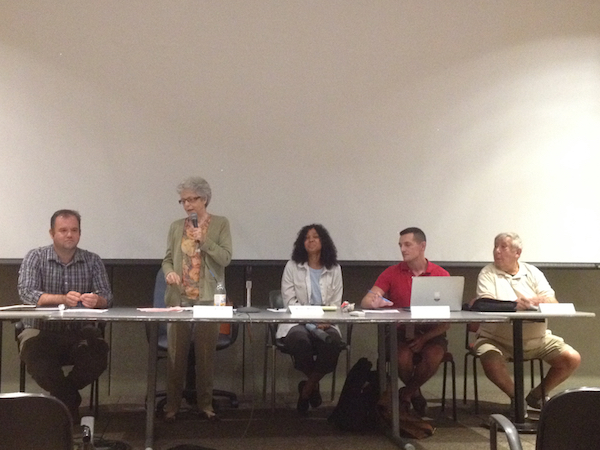
BY SEAN EGAN | “Ladies and gentlemen — back to school,” Christine Berthet, Chair of Community Board 4 (CB4), said with a laugh on the evening of Wed., Sept. 2. And with that, CB4’s Full Board was back in session, after taking a well-deserved month off in August.
The meeting commenced with a presentation by Morgan Monaco, a representative from the Mayor’s Office of Operations, about the new OneNYC (onenyc.gov) initiative, which is subtitled “The Plan for a Strong and Just City.”
“It’s a vision for what we want our city to look like in the next century,” said Monaco. By taking into consideration priorities and universal challenges amongst New Yorkers, the plan attempts to seek out solutions to pressing problems, and to make sure New York City is a better place to live and work in the long term.
Monaco went through the plan’s four so-called “visions” to the assembled crowd. The first, “Our Growing, Thriving City,” deals with keeping New York a diverse, successful city, by focusing on issues of affordable housing, job creation, and improving transportation and culture. The second, “Our Just and Equitable City,” outlines ways to address increasing inequality, by ensuring healthcare, pre-K and the like, while “Our Sustainable City” concerned itself with environmental issues — including the “80 x 50” plan to reduce greenhouse gas emissions by 80 percent by 2050. The final vision, “Our Resilient City,” deals with putting infrastructure in place to protect the city in crises, as well as and preserving neighborhoods.
In a Q&A session after the presentation, it was made clear that those present for the full board meeting weren’t buying into the plan’s broad goals and Monaco’s lofty rhetoric quite so easily. Members of the public and the board bombarded her with hard-hitting questions, which insisted on specific details for courses of action — in the process, revealing issues of importance to the residents of Chelsea and Hell’s Kitchen.
Board member Walter Mankoff seemed to touch on a nerve when he commented that he didn’t see anything in the presentation assuring him that any of the goals could actually be reached, and that they wouldn’t be “remotely possible without hurting the neighborhoods.” A community member in attendance called for increased budgetary support from the mayor’s office, while board member Brett Firfer noted that CB4 has, “liaisons from everybody but the mayor’s office on a monthly basis.”
“We never see them,” chimed in Berthet.
For her part, Monaco insisted that the reason she was at the meeting was because, “We want to make sure this is an ongoing conversation,” in order to listen to the needs of the public and incorporate their suggestions into their work.
This assurance did nothing to stop the questions from flying. The issue of affordable housing came up in a number of permutations — including how to preserve affordable housing that already exists (a stabilized log of existing housing was suggested by resident Pamela Wolfe), and how to produce more of it. Douglas Leland commented that affordable housing and studio space for artists was crucial for the city’s cultural makeup to remain vital, recalling that the city used to be welcoming to creative types — “But now it’s completely the opposite.”

Board member Lily Fan inquired about free public WiFi — an amenity she noted other cities have already adopted — and how it would be feasible.
Lily Pollack, a 52nd St. resident, pressed the issue of the environment, asserting the importance of doing more to reduce air pollution immediately. “2015 is already too late — why wait until 2050 to improve air pollution?” she inquired.
The issue of transportation came up as well, most specifically the issue of working together with New Jersey and Washington D.C. to update the commuter rail system, in order for it to be reliable. Monaco noted that the states had worked together in the past, citing their work on airports.
“Airports don’t bring in commuters,” Berthet quipped, to the audience’s laughter.
Soon thereafter, this portion of the meeting was called to a close. And though Monaco received polite applause as she left the podium, it was clear that the wide-ranging OneNYC program had only helped to stoke the fires of activism — and the desire for concrete answers — from the residents of Chelsea and Hell’s Kitchen.
At the public session, led by First Vice Chair Dolores Rubin, Douglas Leland, President of the Tenants Association of Manhattan Plaza, spoke again, this time taking a moment to bring attention to a fire which broke out at the 484 W. 43rd St. Manhattan Plaza building, resulting in one death. While he praised the many “pro-active and engaged electeds” who responded to the fire, he also took time to advocate for a better plan of action with regards to the evacuation of disabled individuals and seniors in the event of an emergency. With his few remaining seconds (two minutes is the limit during public comment sessions), he advised that the board not approve an extension of hours for the restaurant/bar BEA (403 W. 43rd St., btw. 9th & 10th Aves.), which was on the voting docket later.
Immediately following him, however, were two individuals advocating on behalf of the establishment. Donald Bernstein, a representative from BEA itself, noted that they have been good neighbors, accumulating no complaints, and a petition with 50 signatures of support from locals — which he thought swung their requested hour and a half extension in their favor. After, 30-year W. 43rd St. resident Daphne McWilliams praised the establishment as being a great place in the community to grab a snack or drink, or even hold meetings in. Soon thereafter, Rubin drew the comments to a close.
The representatives from elected officials had relatively little to say, other than to get reacquainted to the group and back in the CB4 swing of things. Drew Lombardi, from Borough President Gale Brewer’s office, highlighted her Manhattan Community Award Program (which provides small grants to non-profits), and Robert Atterbury for Congressman Jerrold Nadler announced that $10.3 million had been secured from FEMA to repair the Intrepid.
Matt Green had a good deal to report from Councilmember Corey Johnson’s office. He reminded the assembled that the second phase of the Participatory Budgeting process begins on Sept. 28, and about his successful Food Bag program, and noted that Johnson’s bill to require sprinklers in places that house animals had been passed. He also highlighted the approval of the Request for Proposal for the 11th Ave. Slaughterhouse site (btw. W. 39th & W. 40th Sts.), which will now be 100 percent affordable housing.
Afterward, Berthet also took pause to single out the Slaughterhouse as well, commenting, “This is just an amazing piece of work” — shortly before announcing the nominating committee for the December CB4 elections.
Some mild controversy was had as the board voted on the letters it would be sending out. Of particular issue was BEA, the restaurant/bar brought up during the public session. Despite being on a side street — albeit quite close to the corner — it wished to push its closing time to 2 a.m. A number of people expressed uncertainty about granting this request, despite the institution’s track record, as it would set a standard for future businesses. Board member James Wallace gave an impassioned plea to deny the request, saying it, “Will set a new precedent,” that “could change the tide in Hell’s Kitchen.
His appeal was successful, as the motion was defeated in an 11 to 21 vote.
Shortly thereafter, Berthet called the very productive, nearly three-hour meeting to a close — leaving no doubt that CB4, like school, was back in session.


































